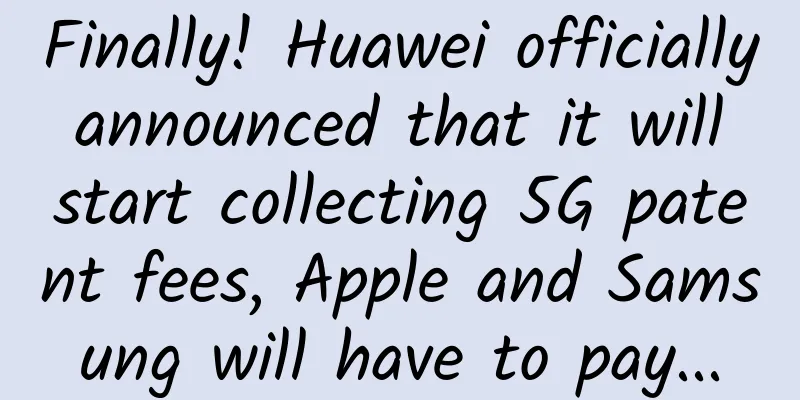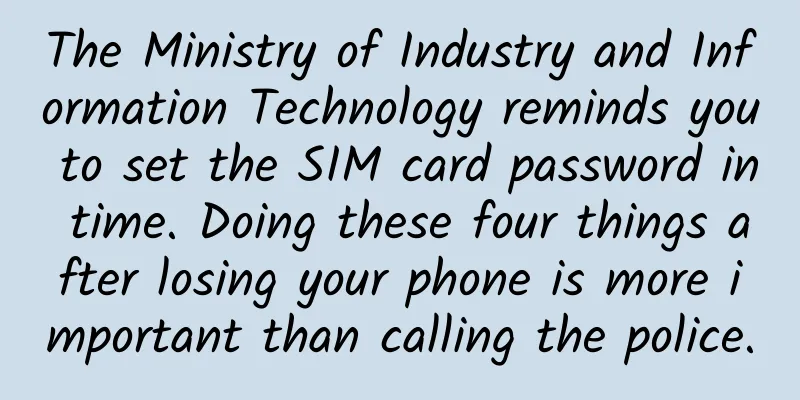Finally! Huawei officially announced that it will start collecting 5G patent fees, Apple and Samsung will have to pay...

|
Yesterday (March 16), Huawei stated at the "Innovation and Intellectual Property White Paper 2020" press conference that its continuous investment in innovation has made Huawei one of the world's largest patent holders, and it will start charging 5G patent fees from 2021. In terms of price, it will provide a reasonable percentage rate applicable to the selling price of 5G mobile phones, with a maximum license fee of US$2.5 per unit.
As of the end of 2020, Huawei holds more than 40,000 sets of valid authorized patents (more than 100,000 pieces) worldwide, of which 5G-related patents account for more than 6%, and more than 90% are invention patents. Huawei expects that after it starts collecting 5G patent fees, the company's intellectual property revenue in 2019-2021 will be approximately US$1.2-1.3 billion, and the scope of open patent licensing will be expanded from telecommunications infrastructure and consumer electronics terminals to IoT and connected vehicles. The forum was held in the outdoor garden of Huawei's campus and released to global media. Huawei's Chief Legal Officer Song Liuping said in his speech that the continued suppression by the US government has put Huawei in the spotlight. Huawei will continue to increase open communication with the society and hopes to showcase Huawei's 30 years of technological innovation and development through the 2020 edition of the white paper.
Ding Jianxin, Director of Huawei's Intellectual Property Department Ding Jianxin, director of Huawei's Intellectual Property Department, said: "Huawei has actually been a company that attaches great importance to innovation since its inception. Huawei's success today is the result of long-term independent innovation and R&D investment." Why did Huawei start charging 5G patent fees at this time? For Huawei, patents are one of its indispensable core competitiveness. According to the 2020 5G patent report released by IPLytics, an internationally renowned patent data company, Huawei ranked first with 3,147 patents, Samsung ranked second with 2,795, and ZTE ranked third with 2,561. The fourth to tenth places were LG, Nokia, Ericsson, Qualcomm, Intel, Sharp, and NTT Docomo. It can be seen that Huawei has a very large competitive advantage in 5G patents. In fact, Huawei has applied for its first Chinese patent since 1995 and its first US patent in 1999. In 2008, it ranked first in the World Intellectual Property Organization's PCT patent application for the first time. In 2019, Huawei ranked second in the number of patent authorizations in Europe and tenth in the United States. Huawei is also the company with the most cumulative authorized patents in China.
Huawei Chief Legal Officer Song Liuping Behind the great achievements, there is a huge investment as a price. Huawei's Chief Legal Officer Song Liuping said: "Huawei invests 10%-15% of its revenue into research and development every year, and has invested about US$90 billion in research and development in the past decade. At present, it has signed more than 100 patent cross-licenses with major ICT manufacturers in the United States, Europe, Japan, South Korea and other countries." As Huawei begins to formally collect 5G patent fees, intellectual property income may become a very important source of income for Huawei. However, Song Liuping also said that intellectual property is not Huawei's main source of income. He said: "Huawei is mainly a company that operates products. The main source of income is still products and services. Products are our main source of long-term income. Compared with Huawei's overall income, intellectual property is not our main source of income. The amount and time invested by Huawei in 4G and 5G are different, and the contribution to the standards is also different. According to these changes, the rate and situation of external licensing will be adjusted." As soon as the news of Huawei collecting 5G patent fees came out, netizens lamented: "Huawei will become the second Qualcomm, Samsung and Apple will start to pay huge fees to Huawei." Is this really the case? Huawei said at the press conference that it will provide a reasonable percentage rate for the price of 5G mobile phones, with a maximum license fee of US$2.5 per unit. As for the criteria Huawei uses to price its 5G patents, Ding Jianping, Huawei's vice president and director of the Intellectual Property Department, explained that the criteria mainly come from two aspects: one is to consider Huawei's R&D investment over the years, and the other is to consider the price level that companies that purchase patents can accept. Specifically, Huawei will conduct one-on-one negotiations with each company that purchases 5G patents, taking into account the cross-licensing of patents between the two parties. In an interview after the press conference, Huawei also stated that it will negotiate specific rates with companies including Apple and Samsung. It is understood that in 2018, Qualcomm announced the 5G charging standards. Mobile phones that use Qualcomm's core patents and only support 5G will be charged a patent fee of 2.275%; mobile phones that use Qualcomm's core patents and support 3G/4G/5G will be charged a patent fee of 3.25%; mobile phones that use Qualcomm's core patents plus non-core patents and only support 5G will be charged a patent fee of 4%; mobile phones that use Qualcomm's core patents plus non-core patents and support 3G/4G/5G will be charged a patent fee of 5%. At that time, Ericsson's 5G patent licensing fee standard was $5 per unit for high-end handheld devices and $2.5 per unit for low-end handheld devices. It can be seen that compared with Qualcomm, Ericsson, etc., Huawei's $2.5 is not high in price just from the data. In addition, as Huawei holds the largest number of 5G patents in the world, the outside world is concerned about whether Huawei will arbitrarily raise prices. In response, Huawei wrote in a statement that it will continue to abide by the FRAND principle, will never blackmail any other company or society, and will try to reduce the licensing fees for 5G patents as much as possible. Is it related to the new sanctions from the US government? Regarding Huawei's move to charge 5G patent fees, some believe that it may also be related to the US government's new round of sanctions policy. According to Reuters on March 12, the Biden administration has stated that it will continue to strengthen U.S. sanctions on Huawei. At the same time, it revised the licenses for U.S. companies to sell products to Huawei this week. These measures are simply aimed at restricting suppliers from selling 5G equipment to Huawei.
In addition to the United States once again tightening restrictions on Huawei, India has also begun to stir up trouble. It is reported that the Modi government is preparing to stop domestic mobile operators from purchasing and using telecommunications equipment produced by Huawei, and the relevant bill will officially take effect in June this year. At the same time, the co-chairman of Balkan Telecom and Media Company pointed out in an interview with reporters that he would also stand with the Biden administration and plan to remove Huawei equipment from European networks. In addition, according to Reuters, although the US government has revised the bill restricting suppliers from selling related products to Huawei, the contracts previously signed between these companies and Huawei are based on the licenses they obtained previously. After the licenses are revised, these contracts will no longer be followed. There is no doubt that this move proves that the crisis suffered by Huawei has not been alleviated and will still be a major challenge for future development. To this end, Huawei's collection of 5G patent fees may be another powerful counterattack. In fact, the US government's sanctions on Huawei have also caused huge losses. According to data released by the Semiconductor Industry Association of the United States earlier this month, due to the impact of the crackdown on Huawei and other Chinese companies, US semiconductor companies have suffered cumulative losses of more than $200 billion and caused nearly 60,000 people to lose their jobs. Final Thoughts As Huawei collects patent fees, some industry insiders believe that this will further encourage more domestic companies to invest in research and development and innovation, and participate in standard setting. There is no doubt that as technology is increasingly valued, my country's related industries will go higher and further. |
<<: Emergen research: By 2028, the global IoT chip market is expected to reach US$34.74 billion
>>: China leads the world in quantum technology patents
Recommend
How high is the spectrum efficiency of 5G?
Wireless spectrum is the most valuable resource f...
8 Software-Based Network Trends for 2019
As networks become increasingly software-based, l...
Huawei's Yu Chengdong: This is a truly global mobile Internet cloud service
Normal 0 7.8 磅 0 2 false false false EN-US ZH-CN ...
The TCP three-way handshake is well known, but what about accidental packet loss? What about intentional non-ACK response?
1. Preface When we talk about the TCP protocol, t...
CloudCone Easter Promotion: $15/year KVM-1GB/30GB/3TB/Los Angeles Data Center
CloudCone offers three special VPS packages for t...
Top 10 patent reexamination invalidation cases in 2016 including Xidian Jietong & Sony
April 26 is the 17th World Intellectual Property ...
5G package users exceed 200 million, 5G mobile phones are accelerating into the popularization period
Recently, China Mobile, China Telecom and China U...
How does the redundancy function of Industrial Ethernet ensure the stability of the network?
Due to the extremely high requirements of industr...
iWebFusion: Dedicated servers from $49/month, 10Gbps bandwidth servers from $149/month, Los Angeles/North Carolina data centers
iWebFusion (also known as iWFHosting) is a well-e...
TD-LTE wins award: Guarding 5G and leading the world
January 9th was a day of harvest for those who ha...
MWC 2018: Top 10 5G Releases
Last week's 2018 Mobile World Congress (MWC) ...
Standard Interconnect's new US lightweight cloud starts at 98 yuan/year, and Hong Kong CN2 starts at 198 yuan per year
At the beginning of the year, we shared informati...
5G services market expected to exceed $919.4 billion by 2031
According to a recent report by Transparency Mark...
Top 5 IT Infrastructure Monitoring Tools
All IT departments face this problem - when probl...
How the Convergence of IoT and 5G Will Shape the Construction Industry
The Internet of Things (IoT) is changing the way ...
![[11.11] CMIVPS 50% off for annual VPS, 30% off for dedicated servers, 20% off for top-up](/upload/images/67cac026052b7.webp)







![[Black Friday] HostKvm Hong Kong Signature VPS is permanently 40% off, top up $50 and get $5 free](/upload/images/67cac22cabdbc.webp)
